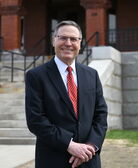Processing Your Payment
Please do not leave this page until complete. This can take a few moments.
Putting the 'hire' in higher education
Abe Turcotte has loved photography since high school, but it wasn't until college that he realized that he could turn his passion into a career. It happened a week into his freshman year when the school's marketing department hired him as a special projects assistant. He ended up making some 100 promotional videos, including a four-minute music clip that went viral. Set to Pharrell Williams' “Happy,” it features students, faculty, cafeteria staff, and even the school's president dancing and lip-synching all over campus to show what a happy place the University of Maine at Farmington is.
Turcotte couldn't agree more. “It's a school that helps you grow as a person, that really supports you and helps you not only find out what you want to do, whatever your passion is, but it supports you in doing that,” he says.
He graduated in 2014 with a degree in business administration outdoor recreation, also did a six-month marketing internship at Saddleback Inc., and is now a videographer, editor and social media manager at Black Fly Media in Portland.
Getting students career-ready has been a priority at UMF since its 19th century roots as a teacher training college. Amid its evolution into a fully fledged liberal arts school and still the only four-year college in western Maine, that mission has grown. Hands-on learning through internships, volunteerism, service learning and research remains a cornerstone of the curriculum, giving students a running start in their future careers and Maine employers a pool of young home-grown talent.
“We have a commitment to our students to prepare them and provide opportunities so they can go from curriculum to career,” says UMF President Kathryn A. (Kate) Foster. “If your aspiration is to come out of school prepared for a job, in terms of knowledge, experience and skills, that's a commitment that Farmington makes. That's something that's really important to us.”
It's a lot to take on for a college with less name recognition and financial might than pricier private peers Bowdoin, Bates and Colby. That's partly due to UMF's location in a county, Franklin, with higher unemployment and poverty rates than the state average. Some 97% of UMF students receive financial aid, which may include on-campus jobs, and all get free season passes to the nearby Titcomb Mountain ski resort.
But the focus is on academics and experiential learning, be it through student teaching, internships, volunteer work and off-campus research projects. The fact that many students come from modest backgrounds makes it more important to gain experience while earning a degree, giving graduates an edge in finding not just a well-paying job but also a fulfilling career. The vast majority of internships at small businesses and community organizations are funded through the UMF's Partnership for Civic Advancement, launched in 2011 with a $45,000 grant from sustaining partner Bangor Savings Bank and now also supported by other foundations and donors.
From teacher training to liberal arts
When it opened in 1864, Farmington State Normal School was Maine's first institute of public higher learning. Now part of the seven-school University of Maine system, it offers over 30 majors spanning the traditional (English, math, history) to the modern (health information systems, actuarial science, aging studies, added in 2011, 2013 and 2016, respectively) and nearly 40 minors. The most popular majors include teacher education psychology, creative writing, rehabilitation services and community health education. There are also four pre-professional studies programs and a grad school program in education.
UMF is constantly expanding its major and minor offerings. And in 2015 it introduced three certificate programs — in alpine operations, addiction rehabilitation and English language learners — to help students gain additional skills and boost their job-market value. The alpine ops certificate, open to all majors, combines ski-related business and other classes with coaching children at Titcomb and internships at Sunday River, Saddleback and Sunday River.
While most majors at UFM have an internship requirement, they are frequently extended and can lead to other internships or paying jobs.
Haley Jaramillo, a senior in environmental planning and policy, interned at both a nonprofit land trust and with Gardiner's city manager, where she drafted and revised policies she defended before the board and conducted grant research. “It was probably the first internship or job that made me feel less like an intern and more like a counterpart to the office,” she says. “It definitely helped improve my idea of myself and what I could provide to a professional setting.”
Among alpine operations participants, sophomore Jed Stevens — a sophomore in outdoor recreation business administration and UMF Alpine team member — is currently interning as a ski instructor at Sugarloaf after a summer internship at the Rangeley Outdoor Sporting Heritage Museum, where he says he learned the importance of communication, planning and networking. After school, he says he may head out west to seek a managerial position at a ski resort. “It helps a lot to show your academic ability and work experience to get a foot in the door,” he says.
Bill Pierce, executive director of the Rangeley Lakes Region Historical Society who hired Stevens and other UMF interns, says that UMF “has nailed an absolute best winner for best practice” on its internship program, adding: “These kids have been the kind of people that inspire me and give me brighter hope for the future.”
Alumni successes
While UMF does not have statistics on alumni employment, there are dozens of success stories across all fields including seven education graduates named “Maine Teacher of the Year” since 2006. Tammy Ranger, the 2017 laureate, graduated from UMF in 1999 and now teaches seventh and eighth grade at Skowhegan Area Middle School, where she also works with children who struggle with reading. She says she gained her “teacher instinct” at UMF, “which seamlessly intertwined theory and practice with highly impactful field experiences.”
And in the burgeoning actuarial science field, senior Emily Franklin will segue from an internship with Compass Health Analytics into a full-time job she'll start this June, just a month after graduating. “It's the right fit and I'm ready to jump in,” she says.
Although UMF doesn't keep statistics on alumni employment, Foster says that surveys will go out in March to various classes and findings should be ready in June.
Out-of-state recruitment drive
Longer term, Foster is on a mission to recruit more students from outside Maine, bringing the percentage to 20% or more from around 18% currently.
She hopes to make that happen through two new creative recruiting initiatives. The first, launched this year and known as the “Farmington is Family” program, offers any daughter or son of an UMF alum in-state tuition even if they reside outside of Maine, cutting their tuition bill by more than half. “The idea is, 'Do your mom and dad know what it was like at Farmington and what experience we provide?' If that sounds appealing to you, then come and have a look,” Foster says
So far, she says the school has heard from six or seven prospective students for the incoming freshman class, though it's too early to give a definitive number and adding that alumni networks are highly effective in luring people from other parts of the country. “We've had clusters from California and a cluster out of Colorado that began as a single person coming to Farmington. The next thing you know you're getting other applications, all of these are journeys of a million miles that begin with a single step,” Foster says.
Another recruitment effort, launched three years ago, offers in-state tuition to any graduate of a Farmington High School in the United States or residing in a town named Farmington — in all, 19 across the country are recognized, according to Foster.
“They're all different,” she says, “except any town called Farmington is probably a pretty small town that got its start as a farming community. They tend not to be major cities, but more rural areas like ours, which is a good connection. For any student coming from a small farming community, Farmington, Maine, is understandable, it's legible, it's familiar and comfortable.”
While there have been only three takers so far, most recently from New York state, Foster says she would like to get a student from every Farmington in the country, even if it takes several years. “If you're into big goals and audacious vision,” she says, “it's a good one.”
















Comments